Soldiers at 16: Sifting fact from fiction
 Published by Child Soldiers International, this short and accessible booklet addresses questions often raised about under-18s in the armed forces, presenting the facts - based on extensive research - rather than the fiction. Also contains very useful quotes and statistics. Great when talking to your MP or for those thinking of enlisting!
Published by Child Soldiers International, this short and accessible booklet addresses questions often raised about under-18s in the armed forces, presenting the facts - based on extensive research - rather than the fiction. Also contains very useful quotes and statistics. Great when talking to your MP or for those thinking of enlisting!
The British armed forces: Why parental consent safeguards are inadequate
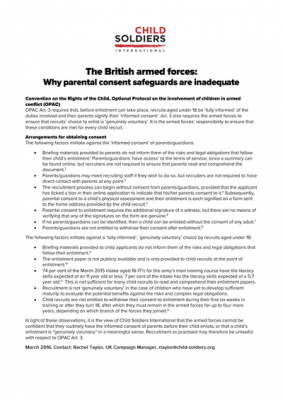 This briefing from Child Soldiers International explains why the armed forces cannot be confident that they routinely have the informed consent of parents before their child enlists, or that a child’s enlistment is “genuinely voluntary” in a meaningful sense.
This briefing from Child Soldiers International explains why the armed forces cannot be confident that they routinely have the informed consent of parents before their child enlists, or that a child’s enlistment is “genuinely voluntary” in a meaningful sense.
ForcesWatch written evidence to the Education Committee’s inquiry on the Purpose and quality of education in England
‘Commonsense and Understanding’: Recommendations from the Defence Committee’s Duty of Care report that are still outstanding 10 years on
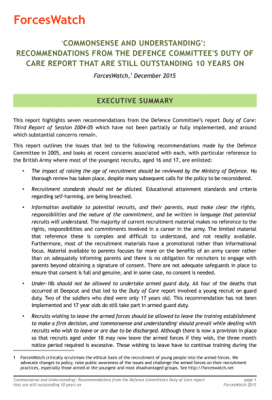 This report highlights seven recommendations from the Defence Committee’s report Duty of Care: Third Report of Session 2004-05 which have not been partially or fully implemented, and around which substantial concerns remain.
This report highlights seven recommendations from the Defence Committee’s report Duty of Care: Third Report of Session 2004-05 which have not been partially or fully implemented, and around which substantial concerns remain.
This report then discusses the concept of 'in loco parentis' and 'moral obligation' with regard to the army's duty of care towards young recruits, noting that the Defence Committee were concerned in 2005 that the MoD distinguished too rigidly between legal and moral obligations, with the latter as less important.
In 2005, the Defence Committee discussed the lack of balance beween training needs and considerations for operational effectiveness, and thus made its recommendations. Ten years on, it is apparent that operational arguments, and current difficulties meeting recruiting targets, continue to prevent the armed forces from reviewing both their position on enlisting under-18s, and their recruitment practices and materials.
Scottish Parliament petition
 In 2016 ForcesWatch and Quakers in Scotland submitted a petition to the Scottish Parliament that calls on the Scottish Government to ensure greater scrutiny, guidance, and consultation with parents/guardians on armed forces visits to schools in Scotland, in order to provide transparency and balance, and in recognition of the unique nature of armed forces careers. In 2018 the Public Petitions Committee made a number of recommendations in their report to the Scottish Government.
In 2016 ForcesWatch and Quakers in Scotland submitted a petition to the Scottish Parliament that calls on the Scottish Government to ensure greater scrutiny, guidance, and consultation with parents/guardians on armed forces visits to schools in Scotland, in order to provide transparency and balance, and in recognition of the unique nature of armed forces careers. In 2018 the Public Petitions Committee made a number of recommendations in their report to the Scottish Government.
Peace education and the promotion of the armed forces in UK schools
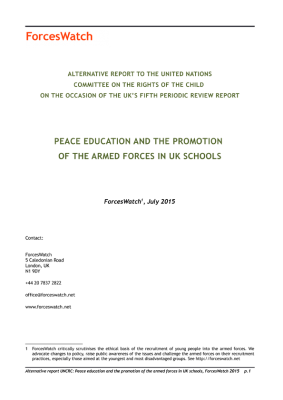 This report highlights that peace education is not being promoted in schools. This is counter to the recommendations made by the United Nations Committee on the Rights of the Child to the UK Government that peace education should be part of the curriculum.
This raises concerns particularly with the increased promotion of the military within schools through the Department for Education's 'military ethos' programme and free military-related learning resources, and as the armed forces continue to conduct a substantial 'youth engagement' programme.
This report highlights that peace education is not being promoted in schools. This is counter to the recommendations made by the United Nations Committee on the Rights of the Child to the UK Government that peace education should be part of the curriculum.
This raises concerns particularly with the increased promotion of the military within schools through the Department for Education's 'military ethos' programme and free military-related learning resources, and as the armed forces continue to conduct a substantial 'youth engagement' programme.
UK Army Recruiting Group – Eligibility quick reference guide
 This recruiting guide, obtained via a Freedom of Information request, indicates among other things that, recruits aged between 16 and 16½ must be given jobs in combat roles (or join as drivers in the logistics corps) which carry the highest levels of risk. (p.8)
This recruiting guide, obtained via a Freedom of Information request, indicates among other things that, recruits aged between 16 and 16½ must be given jobs in combat roles (or join as drivers in the logistics corps) which carry the highest levels of risk. (p.8)
Concerns about armed forces visits to secondary schools in Wales
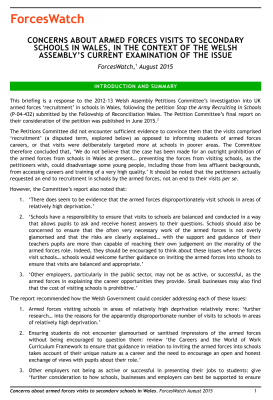 This briefing is a response to the 2012-13 Welsh Assembly Petitions Committee’s investigation into UK armed forces ‘recruitment’ in schools in Wales, following the petition Stop the Army Recruiting in Schools (P-04-432) submitted by the Fellowship of Reconciliation Wales. The Petition Committee’s final report on their consideration of the petition was published in June 2015.
This briefing is a response to the 2012-13 Welsh Assembly Petitions Committee’s investigation into UK armed forces ‘recruitment’ in schools in Wales, following the petition Stop the Army Recruiting in Schools (P-04-432) submitted by the Fellowship of Reconciliation Wales. The Petition Committee’s final report on their consideration of the petition was published in June 2015.
The recruitment agenda behind the UK armed forces’ ‘engagement’ with students in schools and colleges
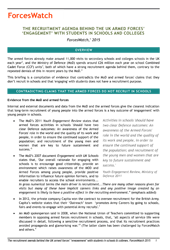
This briefing is a compilation of evidence that contradicts the MoD and armed forces' claims that they don’t recruit in schools and that 'engaging' with students does not have a recruitment purpose.
A critical response to ‘The British Armed Forces: Learning Resource 2014’
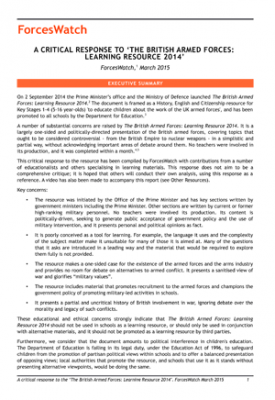 The report is published in conjunction with the video The British Armed Forces: Propaganda in the classroom? produced by Quaker Peace & Social Witness.
This report explains why the British Armed Forces Learning Resource (published in September 2014 by the Prime Minister's Office) is a poor quality educational resource, and exposes the resource as a politically-driven attempt to promote recruitment into the armed forces and “military values” in schools.
The report is published in conjunction with the video The British Armed Forces: Propaganda in the classroom? produced by Quaker Peace & Social Witness.
This report explains why the British Armed Forces Learning Resource (published in September 2014 by the Prime Minister's Office) is a poor quality educational resource, and exposes the resource as a politically-driven attempt to promote recruitment into the armed forces and “military values” in schools.
The British Armed Forces: Propaganda in the classroom?
International Standards on Conscientious Objection to Military Service
Armed Forces Visits to Secondary Schools in Scotland
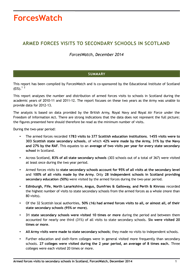 The report, compiled by ForcesWatch, is based on figures obtained under the Freedom of Information Act from the armed forces on their visits to Scottish schools. It has been co-sponsored by the Educational Institute of Scotland which has expressed concerns that some armed forces visits may have a recruitment purpose.
Also see Armed forces visits to schools in Scotland: An update for 2016-2017
The report, compiled by ForcesWatch, is based on figures obtained under the Freedom of Information Act from the armed forces on their visits to Scottish schools. It has been co-sponsored by the Educational Institute of Scotland which has expressed concerns that some armed forces visits may have a recruitment purpose.
Also see Armed forces visits to schools in Scotland: An update for 2016-2017
How ought war to be remembered in schools
 David Aldridge examines the reasons usually advanced for involving children and young people in commemorating the war dead, and finds many of them wanting. He critically examines the high profile in schools of charities, like the Royal British Legion, with vested interests in certain kinds of commemoration. And he argues forcefully for a justification of remembrance in schools that requires a major rethink of established rituals and practices.
David Aldridge examines the reasons usually advanced for involving children and young people in commemorating the war dead, and finds many of them wanting. He critically examines the high profile in schools of charities, like the Royal British Legion, with vested interests in certain kinds of commemoration. And he argues forcefully for a justification of remembrance in schools that requires a major rethink of established rituals and practices.
Spectacle, Reality, Resistance: Confronting a culture of militarism

